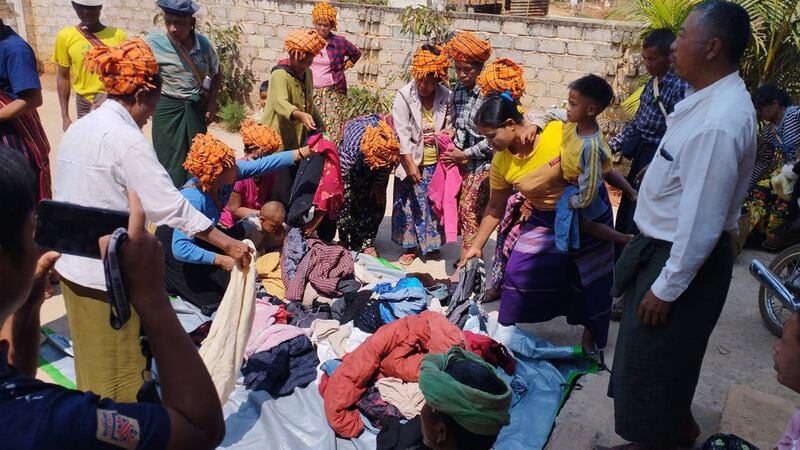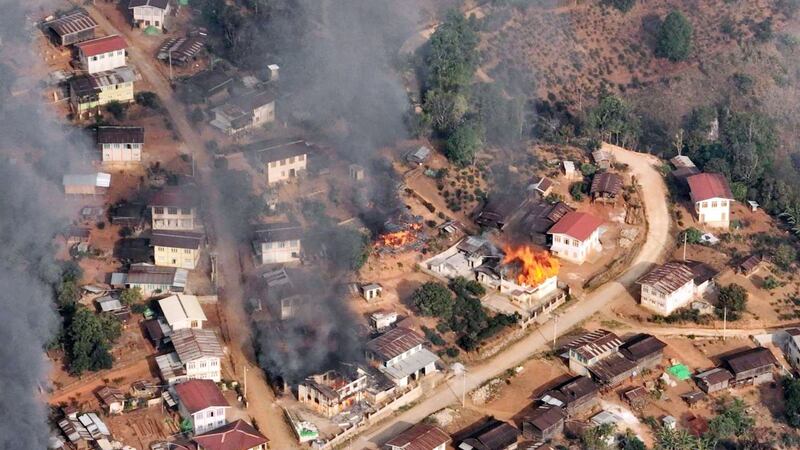Two Myanmar military jets bombed a village in western Myanmar on Thursday where there was no fighting, killing at least 10 people and injuring 20 others, according to ethnic rebels and residents.
The seemingly unprovoked attack on Khuabung village in Thantlang township in Chin state, near the Indian border, is the military’s latest use of air power in its sprawling offensive against anti-junta People’s Defense Force paramilitaries and ethnic armies.
It’s a tactic that has become increasingly common as the country’s armed resistance makes greater gains. Such attacks are typically undertaken by the military to support troops fighting anti-junta forces with devastating effect.
Chin National Front spokesman Salai Htet Ni told RFA Burmese that the strike by the two jets was unprovoked and clearly targeted a civilian population.
However, Thantlang is one of several townships under martial law that the junta has targeted with multiple airstrikes since the start of the year.
“They attacked this morning [at around 10:00 a.m.] without any battles happening,” Salai Htet Ni said. “They dropped bombs into a civilian village.” At least 10 residents were killed and 20 injured, he said.
The airstrike set many of the village’s houses on fire, residents said. Khuabung, around 5 miles (8 kilometers) from the seat of Thantlang township, is home to more than 230 people living in 53 households.
Increasing airstrikes
According to the Chin Human Rights Organization, the military launched at least 53 airstrikes, dropping more than 140 bombs, on the townships of Mindat, Hakha, Matupi and Thantlang in the first two months of 2023 alone.
The strikes killed five members of the Chin National Front and three members of local anti-junta People’s Defense Force, and also injured six civilians.
In addition to the strike on Khuabung village on Thursday, the military also used Mi-35 aircraft to bomb areas it suspected were occupied by local PDF groups, the Chin National Front said.
The military has yet to issue any statement regarding the bombing of Khuabung and attempts by RFA to reach Thant Zin, the junta’s spokesperson for Chin state, went unanswered on Thursday.
A report issued by the U.N. human rights agency earlier this month said that junta airstrikes in Myanmar had more than doubled from 125 in 2021 to 301 in 2022.
The report followed a joint statement on March 1 by Amnesty International, Global Witness, and Burma Campaign (U.K.) urging governments to sanction companies that sell jet fuel to the junta to limit the country’s air force.
While international sanctions have limited the air force to some extent, former military officials in Myanmar have said they will never be fully effective while powerful countries, such as Russia and China, are backing the junta.
Deaths and displacements in Shan state
News of the airstrikes on Thantlang came as RFA learned that at least 33 civilians were killed and more than 5,000 displaced from southern Shan state’s townships of Pinlaung, Pekon and Mobye during the first three months of the year alone.
Yin Lianghan, a spokesperson for the Shan Human Rights Foundation, said his organization had compiled the statistics after interviewing Buddhist monks displaced by the violence, as well as aid workers in the region.
“These people have been severely displaced because of the junta’s heavy artillery shelling and a massacre in the Nam Neint village,” he said, referring to an incident on March 11, in which junta troops killed 21 civilians, including three monks, in a dawn raid on a monastery in Pinlaung before setting fire to the village.
“The main reason why they have become refugees is because of the junta’s extrajudicial killing of innocent civilians,” he said.

Junta Deputy Information Minister Major Gen. Zaw Min Tun has told pro-junta media that the Karenni National Defense Army committed the massacre in Nem Neint village, but the KNDF claims that it was the handiwork of the military.
According to Shan Human Rights Foundation, at least two children were among those killed by the military shelling in Pinlaung and Mobye townships since the start of the year..
Tensions rising
Khun Bwe Hone, the information officer for the ethnic Pa’O National Defense Force, told RFA that the deaths and displacements occurred amid rising tensions between the military and the ethnic Karrenni Nationalities Defense Force in the three townships, as the junta is preparing a major offensive in the area.
“The junta is reinforcing its troops,” he said, noting that most villagers have already left the area in anticipation of the fighting.
“Our defense forces have warned them to flee to safety. That's why they left. This battle is likely to be drawn out because we are determined to fight against the military dictatorship … to the end and the enemy is going to do what it has set out to do, too.”
A woman who fled fighting in the area told RFA on condition of anonymity that civilians are pouring into the seat of Pinlaung township from nearby villages to take refuge in camps for the displaced.

The exact number of refugees is unknown, said aid worker Khun Kyaw Shwe. While the refugees are receiving assistance from social support groups and area residents, they are in “desperate need of medicine,” as well as food and access to clean water, he said.
“At the moment, local medical teams are taking care of them with what little medicine they have,” Khun Kyaw Shwe told RFA. “The demand for medicine is quite severe. The refugee camps are dealing with outbreaks of malaria, influenza and respiratory infections.”
Only around 20 days of food stores remain for the camps in Pinlaung, he said, urging international donors to help fill the gaps.
RFA was unable to reach Khun Thein Maung, the junta’s economic minister and spokesman for Shan state, for comment on the killings and displacements.
Translated by Myo Myin Aung. Edited by Joshua Lipes and Malcolm Foster.
